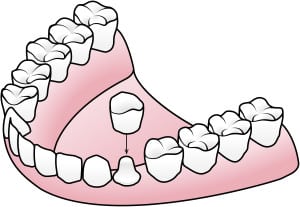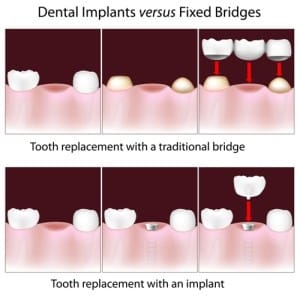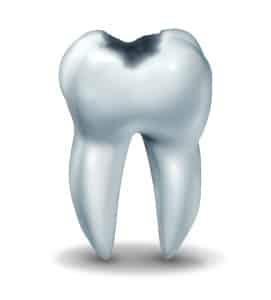 Do you have difficulty sleeping? Each year millions of Americans have trouble going to sleep as a result of a serious disorder. Known as obstructive sleep apnea, or OSA, the disorder can prevent the deep, continuous sleep needed to function properly thorough the day. Fortunately, we can discuss possible treatment options.
Do you have difficulty sleeping? Each year millions of Americans have trouble going to sleep as a result of a serious disorder. Known as obstructive sleep apnea, or OSA, the disorder can prevent the deep, continuous sleep needed to function properly thorough the day. Fortunately, we can discuss possible treatment options.
How A Crown Is Placed
 Although placing a dental crown is more invasive than an inlay or an onlay, it is not a very complex procedure. It takes two visits, but only because the crown is fabricated outside the office in a dental lab. During the first visit your dentist prepares the tooth, during the second visit he or she places the crown. You may know someone who has received a dental crown, or your dentist may have suggested that you need crown treatment, so today we explain how a crown is placed.
Although placing a dental crown is more invasive than an inlay or an onlay, it is not a very complex procedure. It takes two visits, but only because the crown is fabricated outside the office in a dental lab. During the first visit your dentist prepares the tooth, during the second visit he or she places the crown. You may know someone who has received a dental crown, or your dentist may have suggested that you need crown treatment, so today we explain how a crown is placed.
Bridge VS Implant
 Replacing a tooth not only restores your smile, but it also restores your chewing function. Even the lack of one tooth can affect how you chew and inevitably the foods you choose to eat. Another reason for replacing a tooth is so your other teeth remain straight. When a tooth is missing, the adjacent teeth will try to fill the empty space by tilting and shifting which can lead to a misaligned bite and other issues. If you have a tooth missing or need a tooth removed and are wondering what options are available to replace your tooth, dental bridges and dental implants are two available options.
Replacing a tooth not only restores your smile, but it also restores your chewing function. Even the lack of one tooth can affect how you chew and inevitably the foods you choose to eat. Another reason for replacing a tooth is so your other teeth remain straight. When a tooth is missing, the adjacent teeth will try to fill the empty space by tilting and shifting which can lead to a misaligned bite and other issues. If you have a tooth missing or need a tooth removed and are wondering what options are available to replace your tooth, dental bridges and dental implants are two available options.
Are You Suffering From Xerostomia?
 Are you suffering from xerostomia? You are if you have a chronic dry mouth. Xerostomia is the medical word for just that: dry mouth. Dry mouth often affects people as they age and can increase the risk for tooth decay, gum disease, and bad breath. Saliva may just seem like spit to you, but it is important to your oral health. It keeps your oral mucosa moist, helps wash away food debris, and neutralizes acids that cause decay. Take the true or false quiz below to find out how much you know about xerostomia (dry mouth).
Are you suffering from xerostomia? You are if you have a chronic dry mouth. Xerostomia is the medical word for just that: dry mouth. Dry mouth often affects people as they age and can increase the risk for tooth decay, gum disease, and bad breath. Saliva may just seem like spit to you, but it is important to your oral health. It keeps your oral mucosa moist, helps wash away food debris, and neutralizes acids that cause decay. Take the true or false quiz below to find out how much you know about xerostomia (dry mouth).
Aging Teeth: Part 2
 Although as you age your bones can become more brittle and fragile, that is not the same with teeth. Teeth tend to remain strong. However, there are several factors that come into play that can wear down, decay, or otherwise damage your teeth and gums as you age. Some of these factors include habits such as bruxing (the chronic grinding and clenching of your teeth); a high sugar diet which causes decay and can lead to gingivitis and periodontal disease; a misaligned bite, and more. In the first installment of Aging Teeth, we discussed mechanical wear, structural wear, and erosion, but there are other ways your teeth change as you age. Find out what they are in Aging Teeth: Part 2.
Although as you age your bones can become more brittle and fragile, that is not the same with teeth. Teeth tend to remain strong. However, there are several factors that come into play that can wear down, decay, or otherwise damage your teeth and gums as you age. Some of these factors include habits such as bruxing (the chronic grinding and clenching of your teeth); a high sugar diet which causes decay and can lead to gingivitis and periodontal disease; a misaligned bite, and more. In the first installment of Aging Teeth, we discussed mechanical wear, structural wear, and erosion, but there are other ways your teeth change as you age. Find out what they are in Aging Teeth: Part 2.
Aging Teeth: Part 1
 Have you noticed that as you get older you’re having more problems with your teeth? Maybe they are becoming sensitive, looking darker, chipping or cracking, or just aching. Your teeth do change as you age. Just think of it. The rest of your body changes why shouldn’t your teeth? After all, they chew, crunch, bite, and grind day-in-and-day-out for years on end. They take a lot of wear and tear. And just as wear and tear over the years takes a toll on your body, the same happens with your teeth. Here is how aging teeth can change.
Have you noticed that as you get older you’re having more problems with your teeth? Maybe they are becoming sensitive, looking darker, chipping or cracking, or just aching. Your teeth do change as you age. Just think of it. The rest of your body changes why shouldn’t your teeth? After all, they chew, crunch, bite, and grind day-in-and-day-out for years on end. They take a lot of wear and tear. And just as wear and tear over the years takes a toll on your body, the same happens with your teeth. Here is how aging teeth can change.
A Sugar Society
 Researchers have recently explored documents from the food industry that date back to the 1960s. It was apparently around then that scientists first found that sugar was a major factor in tooth decay. Due to this information, dentists recommended limiting the use of sugar in foods to restrict intake and help reduce cavities among Americans. The researchers who have culled through the 60s documents are pointing the finger at the sugar and food industries for ignoring the plea. According to the researchers, the blame for tooth decay was deflected onto other sources by the food and sugar industries, similar to how the tobacco companies turn away from any wrong doing, and how the food industry ignores the obesity problem.
Researchers have recently explored documents from the food industry that date back to the 1960s. It was apparently around then that scientists first found that sugar was a major factor in tooth decay. Due to this information, dentists recommended limiting the use of sugar in foods to restrict intake and help reduce cavities among Americans. The researchers who have culled through the 60s documents are pointing the finger at the sugar and food industries for ignoring the plea. According to the researchers, the blame for tooth decay was deflected onto other sources by the food and sugar industries, similar to how the tobacco companies turn away from any wrong doing, and how the food industry ignores the obesity problem.
Can You Still Get Gold Fillings?
 There was a time when gold fillings were common. Then silver amalgam popped up. Then white composite fillings were developed. White composite fillings are the treatment of choice for anterior (front) teeth, because the composite material blends with the original dentition. Gold and silver are noticeable and not aesthetically pleasing if you should flash your smile. However, gold fillings are still used and are the treatment of choice for specific situations. (more…)
There was a time when gold fillings were common. Then silver amalgam popped up. Then white composite fillings were developed. White composite fillings are the treatment of choice for anterior (front) teeth, because the composite material blends with the original dentition. Gold and silver are noticeable and not aesthetically pleasing if you should flash your smile. However, gold fillings are still used and are the treatment of choice for specific situations. (more…)
Traditional X-Rays VS Digital
 There are different types of x-rays including medical x-rays, dental x-rays, and even x-rays taken at the airport, and not all types of x-rays emit the same amount of radiation. The radiation from traditional dental x-rays is minute. However, digital x-rays have several benefits compared to traditional x-rays. Today we compare traditional x-rays to digital x-rays. (more…)
There are different types of x-rays including medical x-rays, dental x-rays, and even x-rays taken at the airport, and not all types of x-rays emit the same amount of radiation. The radiation from traditional dental x-rays is minute. However, digital x-rays have several benefits compared to traditional x-rays. Today we compare traditional x-rays to digital x-rays. (more…)
It’s A New School Year And Time For A Cleaning
 Parents are always super busy getting ready for the new school year, and that time is now. However, it is a great time to schedule dental cleanings for the family. It is easy to skip out on those bi-annual appointments when you are so busy, but teeth cleanings are especially important. If you encourage attention to dental health while your kids are still young, it will make a difference as they get older. Your dental health affects your whole health. A healthy mouth can help equal a healthy body and research proves it. Now is the time to think about your family’s teeth because it’s a new school year and a great time for a dental cleaning.
Parents are always super busy getting ready for the new school year, and that time is now. However, it is a great time to schedule dental cleanings for the family. It is easy to skip out on those bi-annual appointments when you are so busy, but teeth cleanings are especially important. If you encourage attention to dental health while your kids are still young, it will make a difference as they get older. Your dental health affects your whole health. A healthy mouth can help equal a healthy body and research proves it. Now is the time to think about your family’s teeth because it’s a new school year and a great time for a dental cleaning.
(more…)







